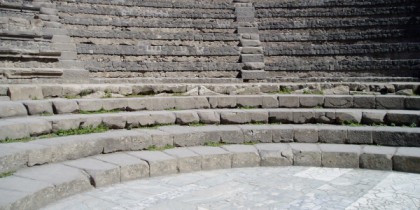
November 29, 2014, by Esther Eidinow
On (Not) Spoiling the Medea
Lynn Fotheringham reflects on the National Theatre’s recent production of Medea.
In 2007 there was a new film-adaptation of Richard Matheson’s 1954 novel, I am Legend. Two previousversions had failed to justice to the original twist-ending, which chillingly inverts the roles of the vampires/zombies and their hunter. I knew in my heart of hearts that this Hollywood blockbuster wasn’t going to ‘do the proper ending’ either, turning Will Smith from hero to villain in the last ten minutes. But I couldn’t help hoping. I even managed to interpret one incident as meaning that the film might be heading in that direction; inevitably, I was disappointed.
Watching an adaptation of a beloved novel and a production of a well-known play can be similar experiences. I was delighted to have the chance to see this year’s National Theatre production of the Medea again at the Broadway recently, and not only because of Helen McCrory’s blistering performance and the dazzling staging. I particularly wanted to re-watch it because I felt my first experience had been strongly affected by not knowing how it was going to end, and I wanted the chance to re-evaluate.
It may seem odd to talk about ‘not knowing how it was going to end’ in the case of a Greek tragedy. But anyone producing this play has to decide how to deal with its ending, when Medea escapes in an air-borne chariot loaned to her by her grandfather, the sun-god. This Medea was produced in a contemporary setting, and Ben Powers’ translation is in a very modern idiom. Every surviving reference to the gods or Medea’s magical powers prompted me to wonder whether they would ‘do the ending’. They didn’t, and part of me was disappointed.
I almost wished I had read the reviews beforehand and got over any disappointment about this before the performance started. I had chosen not to do so in order to avoid spoilers – spoilers not about ‘what happens’ but about the approach taken to the events and characters. I’m generally pretty blasé about ‘what happens’ spoilers, perhaps because, as a Classicist familiar with multiple re-tellings of the same myths, I’m used to knowing the end of the story and still being intrigued by how this telling gets there. I avoid reading theatre-reviews in advance because they might ‘spoil’ how the story is presented, which is precisely what I want to be intrigued by as the production unfolds.
When you know a play/novel really well, though, you’re ‘pre-spoiled’ for a production/adaptation by that knowledge, including knowledge of what previous versions have done/failed to do. (Other productions of the Medea have also avoided the supernatural ending – and been criticised for it by Classicists.) I wanted to see this production again, thoroughly ‘spoiled’ as to how it was presenting Euripides’ play, but escaping the need to analyse each aspect for what it could tell me about a problem issue that, because of this ‘pre-spoiling’, I knew was coming. Thanks to NT Live, I got the chance to do so, and it was fantastic. Not spoiled at all.
[Postscript: For an excellent review of this production from a Classicist’s point of view, see Mary Beard in the TLS.]
Image: Odeon, Pompeii, by Lynn Fotheringham.
No comments yet, fill out a comment to be the first

Leave a Reply